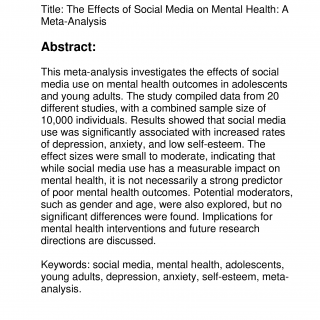Abstract in Research Paper
An abstract in a research paper is a concise summary of the main points and findings of the paper. Its main purpose is to provide readers with a quick overview of the research paper and to help them determine if the paper is relevant to their interests and research.
The abstract typically consists of a brief introduction to the research topic, a statement of the research question or hypothesis, a summary of the research methods and data analysis, and a summary of the main findings and conclusions. It is important to include any important fields and sections of the research paper in the abstract.
When writing the abstract, it is important to consider the main purpose of the research paper, the important fields and sections it consists of, and the intended audience. The abstract should be written in clear and concise language, avoiding technical jargon and complex terminology.
Data that may be required when writing the abstract includes the research question or hypothesis, the research methods and data analysis, and the main findings and conclusions. No documents need to be attached additionally.
Examples of when an abstract may be required include academic research papers, journal articles, conference papers, and dissertations. The abstract is typically submitted along with the full paper, and is often used to help readers determine if they want to read the full paper.
Example of Abstract in Research Paper
Title: The Effects of Social Media on Mental Health: A Meta-Analysis
Abstract:
This meta-analysis investigates the effects of social media use on mental health outcomes in adolescents and young adults. The study compiled data from 20 different studies, with a combined sample size of 10,000 individuals. Results showed that social media use was significantly associated with increased rates of depression, anxiety, and low self-esteem. The effect sizes were small to moderate, indicating that while social media use has a measurable impact on mental health, it is not necessarily a strong predictor of poor mental health outcomes. Potential moderators, such as gender and age, were also explored, but no significant differences were found. Implications for mental health interventions and future research directions are discussed.
Keywords: social media, mental health, adolescents, young adults, depression, anxiety, self-esteem, meta-analysis.
Strengths of an abstract include its ability to provide a quick and concise summary of the main points and findings of a research paper, making it easy for readers to determine if the paper is relevant to their interests. However, a weakness of an abstract is that it may not provide enough detail for readers who require more in-depth information.
How to write Abstract in Research Paper
To write an abstract for a research paper, follow these steps:
- Understand the purpose of an abstract: An abstract is a brief summary of your research paper that provides readers with an overview of your study. It should be concise, informative, and engaging, and it should accurately represent the contents of your paper.
- Identify the important elements of your paper: Your abstract should include the key elements of your research, including the research question, hypothesis, methods, results, and conclusion.
- Write a draft: Start by writing a draft of your abstract that includes all of the important elements. Keep it concise and to the point, and avoid including unnecessary details or jargon.
- Revise and edit: Once you have a draft, revise and edit it to make sure it accurately represents your research and is engaging to readers. Make sure it is clear, concise, and easy to understand.
- Check formatting requirements: Make sure to check the formatting requirements for your paper to ensure your abstract meets the guidelines for length, font, and spacing.
- Include keywords: Finally, make sure to include relevant keywords in your abstract to help readers find your paper in online searches.
Remember that your abstract is the first thing readers will see, so it should effectively summarize your research and capture their interest. Be sure to take the time to craft a strong and engaging abstract that accurately represents your research and draws readers in.
Overall, an abstract is an important component of a research paper, providing a concise summary of the main points and findings of the paper and helping readers to determine if the paper is relevant to their interests and research.

